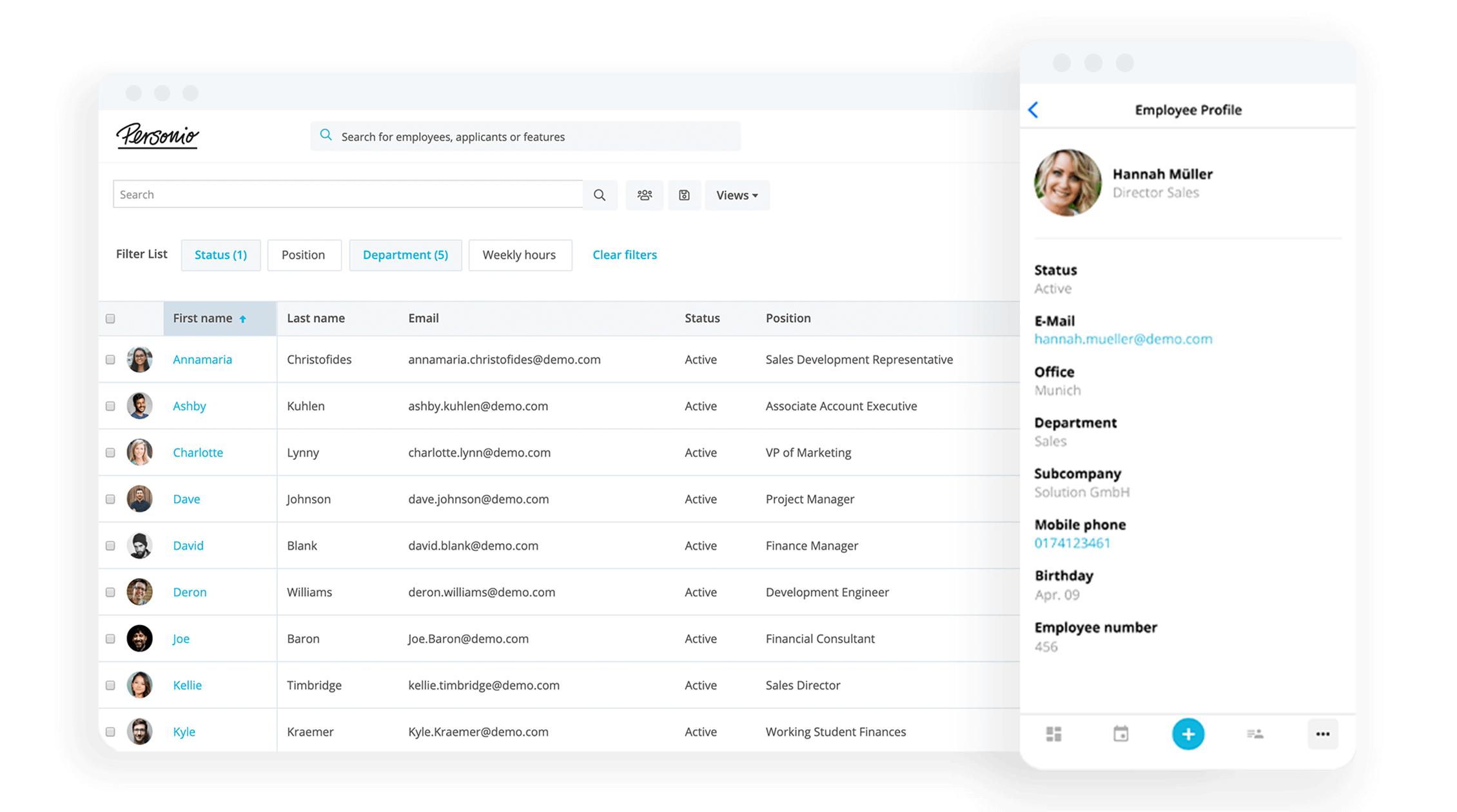Types of Apprentice Contracts in the UK
Looking to learn more about UK apprentice contracts? These days, apprenticeships help people make career changes, support businesses in upskilling their employees, train up new employees and prepare the workforce for the skills of tomorrow.
In this article, we help define the term ‘apprenticeships’, explain what an apprentice contract (more commonly known as an apprentice agreement) is and what this agreement should include if you’re operating in the UK.
Keep a detailed record of all your important documents with Personio.What are Apprenticeships?
Apprenticeships are jobs provided with training. Since 2017, many British employers have been paying an apprenticeship levy. Apprenticeships are an excellent way for employees to learn about the job they’re doing while they receive training and lead towards nationally-recognised qualifications.
And, the data doesn’t lie. 86% of employers have said apprenticeships have helped them develop relevant skills for their organisation, and 78% say they have helped improve productivity.
Are Apprenticeships Just for Young People?
Apprenticeships are not simply for the young. They are available to anyone over the age of 16 – but care must be given to avoid putting an upper age limit on apprenticeships, as this could be seen as a type of discrimination.
What are the Benefits of Apprenticeships?
Apprenticeships are increasingly used as a way to upskill existing employees in addition to hiring someone new. They can help grow talent and develop a motivated, skilled and qualified workforce.
Additionally, apprenticeships can also supplement or complement employee training programs. But, up to 80% of an apprenticeship must be made up of on-the-job training, with at least 20% of the apprenticeship being committed to off-the-job training.
Who Pays for Apprenticeships?
Since 2017, large employers (those paying more than £3 million in wages) have been required to pay an apprenticeship levy: 0.5% of an employer’s annual pay bill, according to gov.uk.
Today, smaller employers are eligible for government funding which will pay between 95% and 100% of apprentices’ training costs. Find out more about apprenticeship funding rules on the gov.uk website.
What is an Apprentice Contract?
An apprenticeship agreement is a type of contract that is specific to apprenticeships. Similar to an employment contract, it can include employment terms and holiday leave.
However, it’s not the same as an employment contract because it must include the details we list in the next section on apprenticeship agreements.
It’s helpful to think of an apprentice contract in two parts:
An apprenticeship agreement
An apprenticeship commitment statement.
Both documents must cover what is included in an apprentice’s on-the-job training (which the employer is required to provide) and what they should do during their off-the-job training (which must be at least 20% of their working hours).
Usually, apprenticeship training schedules are designed by a training provider. The employer can also design them, but they must be agreed upon between the business and a training provider.
What is an Apprenticeship Agreement?
The UK government provides a template employers can use to form apprenticeship agreements.
It doesn’t have to be used, but whatever document is signed, it must contain information including:
The employer and employee’s names and employer’s address
The length of employment
The training they’ll receive
The apprentice’s role and the programme they’ll be undertaking
How much they’ll be paid
What their working conditions are
How many hours they’ll work
What qualifications they’re working towards
The apprenticeship start and end date.
It can also include their job role and contain information about what happens if the employer/apprentice relationship ends before the agreed date.
Businesses and apprentices are also expected to sign an apprenticeship commitment statement with the training provider before an apprenticeship begins. (You can find an apprenticeships commitment statement template here).
What Should Be Included in an Apprenticeship Contract?
Apprenticeship contracts are more accurately known as apprenticeship agreements. As stated above, they must include information about the following:
Employee and employer’s name
Employment length
Type of training
Pay rates
Working conditions and hours
Start and end dates
Planned numbers of on- and off-the-job training
Qualifications being worked towards.
Apprenticeship agreements must be signed and dated by the apprentice and the employer. A signed apprenticeship commitment statement must also accompany an apprenticeship agreement.
Frequently Asked Questions About Apprentice Contracts
What Is an Apprentice Contract?
An apprentice contract is more commonly known as an apprenticeship agreement in the UK. This is an agreement between an employer and an apprentice that governs how long they will be expected to participate in the apprenticeship, what they’ll study, what they’ll be paid, what their working conditions are and when the contract will be completed.
What Are the Types of Apprenticeship Contracts?
Before 2018, there were various types of apprenticeship contracts: a contract of apprenticeship, Approved English Apprenticeships and apprenticeship agreements. Any employer entering a contract with an apprentice (from 2022 onwards) must use an apprenticeship agreement. Employers, apprentices and training providers must also sign an apprenticeship commitment statement before an apprentice starts work.
What Should an Apprentice Contract Include?
An apprentice contract (more accurately known as an apprentice agreement these days) must include the apprentice’s name, the standard of apprenticeship (version and level), their place of work (employer’s name and location), the start and end date of the apprenticeship and the start and end date of the practical period and duration, as well as the planned amount of off-the-job training. It must be signed, dated by both parties, and accompanied by an apprenticeship commitment statement.
Where Do You Currently Store Contracts?
Employee contracts are a sensitive matter, and you want to make sure they are stored somewhere that is both secure and accessible. In Personio, you can have the best of both worlds thanks to our Digital Employee File feature. You can store critical documents in each employee profile, access them with ease and rest easy knowing they are secure.
Looking to learn more? Consider starting a free 14-day trial of Personio, or speak with one of our HR experts, today.


